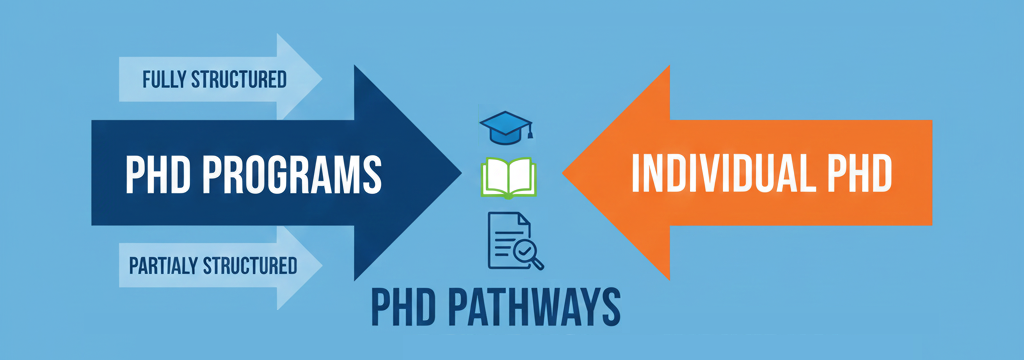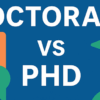
Many people assume a PhD and a doctorate degree are the same, but this is a misconception in many fields. A PhD is one type of doctorate, specifically a research-focused degree, with a dissertation that contributes to the advancement of knowledge in a research area, preparing students for academic and research-oriented job positions. For example, disciplines in STEM fields typically culminate in a PhD. While other doctoral degree branches (i.e., professional doctorate degrees and first professional degrees) represent the highest academic degree in certain fields, they prepare students for professional practices as company leaders, lawyers, general practitioners, etc. This article explores the doctorate vs PhD confusion and also distinct doctoral degree types in detail.
Doctorate vs PhD: 3 Major Doctoral Categories
Selecting the appropriate academic or career path requires an understanding of the various kinds of doctoral categories. Despite the widespread belief that all “doctorate degrees” have the same function, doctoral education actually falls into three major categories, each with unique career paths and outcomes. The most well-known route is the PhD, which is a research doctorate focused on generating new knowledge via scientific investigation and research. Professional doctorate degrees, on the other hand, concentrate on using advanced research to fulfill real-world leadership positions in particular industries. Lastly, graduates with first professional degrees are eligible for licensure in highly regulated professions like law or medicine. Examining these categories makes it easier to determine which degree best suits individual objectives.

What is a PhD?
PhD is the abbreviation of the Latin term Philosophiae Doctor, which translates to Doctor of Philosophy in English. It represents the highest degree level in many academic fields, e.g., STEM and humanities. This prestigious qualification centers around a rigorous research-based endeavor, where candidates delve into the realms of original and substantial contributions to their chosen field. A cornerstone of this journey is writing a dissertation, often spanning 200-300 pages or 60,000-100,000 words. Ultimately, it must undergo a rigorous oral examination (viva) before a panel of examiners. A full-time PhD journey typically takes 3-6 years. It prepares graduates for careers in academia as professors. Still, they are also valuable for research-intensive roles in industry and government institutions.

What is a Professional Doctorate Degree?
In most non-STEM fields, such as education, public health, business administration, design, and arts, students typically pursue professional doctorates rather than PhDs. Examples include Doctor of Education (EdD), Doctor of Design (DDes), and Doctor of Arts (DA). Professional doctorate degrees are designed for experienced practitioners seeking advanced leadership and applied research skills within their profession. Unlike PhD programs, which focus on original research, professional doctorates emphasize solving real-world problems using evidence-based strategies. Coursework focuses on management, innovation, policy, and organizational transformation, culminating in an applied dissertation or capstone project that demonstrates impact in professional practice. Graduates pursue senior executive roles, clinical practice, educational leadership, and policy development.
What is a First Professional Degree?
In regulated fields like medicine, dentistry, law, pharmacy, and veterinary science, first professional degrees (e.g., MD, JD, DDS, and PharmD) prepare students for licensure and clinical or legal practice. Despite having the title of “Doctor”/”Dr.”, these degrees differ greatly from academic doctoral programs, where they emphasize professional practices over the production of scholarly research. To guarantee that graduates fulfill stringent industry standards and legal requirements for practice, programs combine in-depth theoretical coursework with practical clinical or hands-on training. Their goal is to prepare skilled professionals to provide knowledgeable services to society, not to increase knowledge through research.
What Fields Offer both PhD and Professional Doctorate?
Depending on their career goals, students can choose between a research-driven PhD and a practice-oriented professional doctorate degree. Education, business management, psychology, social work, public health, nursing, engineering, physical therapy, and fine arts or design are among the common fields that offer both professional doctoral pathways and PhDs. In these disciplines, the terms “professional doctorate” and “PhD” do not overlap and are not interchangeable. They allow students to select either a professional track that focuses on using advanced research to lead innovation in practice (for a professional doctorate degree) or an academic track that focuses on producing original research and contributing new knowledge (for a PhD degree). For example, EdD vs PhD in education is a dilemma for education students.
Which Programs Offer PhD Joint with First Professional Degrees?
Several academic fields within the PhD in Health Sciences, offer joint doctoral pathways that combine a research-focused PhD with a first professional degree (e.g., MD, DDS, PharmD, etc.), allowing students to integrate scientific discovery with professional practice. Common examples include MD–PhD programs in biomedical and life sciences, DDS–PhD in dental sciences, PharmD–PhD in pharmaceutical sciences, and DVM–PhD in veterinary and animal sciences. These programs are designed for students aiming to become clinician-scientists, practitioner-researchers, or policy experts with strong analytical foundations. Training typically blends advanced coursework, professional certification, and extended research periods, preparing graduates for leadership roles across academia, industry, healthcare, and public-sector research environments.
PhD vs Doctorate Conclusion
Understanding the difference between PhD and doctorate is essential to selecting the best doctoral pathway. Although regarded as advanced credentials, each has a distinct function in further education and professional advancement. The goal of a PhD is to increase knowledge through original research, typically leading to careers in academia or research. Professional doctorate degrees, however, prepare graduates for advanced leadership roles in professional settings by applying research to solve real-world problems. First professional degrees, on the other hand, provide the credentials necessary to obtain a license in a regulated profession, such as law or medicine. Students can match their educational choices with their long-term professional objectives and aspirations by being aware of these differences.
Table 1. Doctorate vs PhD distinctions at a glance.
| Category | Research Focus | Practice Focus | Licensure Requirement | Dissertation Writing? | Dissertation Defense? |
|---|---|---|---|---|---|
| PhD Degrees | ✅ | ❌ | ❌ | ✅ | ✅ |
| Professional Doctorate Degrees | ✅ (applied) | ✅ | ✅ (sometimes) | ✅ (applied) | ✅ |
| First Professional Degrees | ❌ | ✅ | ✅ | ❌ | ❌ (but, clinical examinations or licensing exams) |
Frequently Asked Questions (FAQs)
Is a PhD the same as a doctorate degree?
Yes and No! The answer to the doctorate vs PhD misconception is: a PhD is one type of doctoral degree, specifically focused on research and academic contributions. Other types (professional doctorate degrees and first professional degrees) focus on advanced professional practice rather than research.
Which is harder: a PhD or a professional doctorate?
Both are equally demanding but in different ways. A PhD emphasizes original research, academic writing, and theoretical depth, while a professional doctorate focuses on applying advanced knowledge to solve real-world professional problems.
Which doctoral degree is the highest in rank?
Both PhD and professional doctorate degrees are terminal degrees. The “highest” depends on the career path: academic vs professional practice.
Can I call myself “Doctor”/”Dr.” with a professional doctorate?
Yes. Holders of both PhD and professional doctorate degrees are entitled to use the title “Doctor”/”Dr.”. However, in academic settings, the Doctor of Philosophy is usually associated with research expertise, while professional doctorates signal specialized professional mastery.
Can a professional doctorate lead to teaching at universities?
Yes, especially in practice-focused disciplines, but a PhD is generally preferred for research-intensive academic positions.
What is the purpose of joint X-PhD programs where X = MD, DDS, or JD?
These joint doctorate degrees (e.g., MD-PhD, DDS-PhD, DVM-PhD) are designed to train professionals who can combine advanced research skills with clinical, legal, or professional practice.
Which degree should I choose between professional doctorate and PhD?
It depends on your career goals. Choose a PhD if you aim for an academic or research career. Choose a professional doctorate if you want to advance as a practitioner, executive, or industry leader in your professional field.
Are first professional degrees considered doctoral degrees?
They use the title “Doctor”/”Dr.”, but academically, they are not considered research or scholarly doctorates.
Do all doctoral students write a dissertation?
PhDs always do. Most professional doctorates include a dissertation or applied project. First professional degrees usually do not.
Which doctoral path is best for earning potential?
It depends on the field! Physicians, dentists, pharmacists, and lawyers often earn more in clinical or legal practice, while research careers vary by discipline.




Leave Your Comment